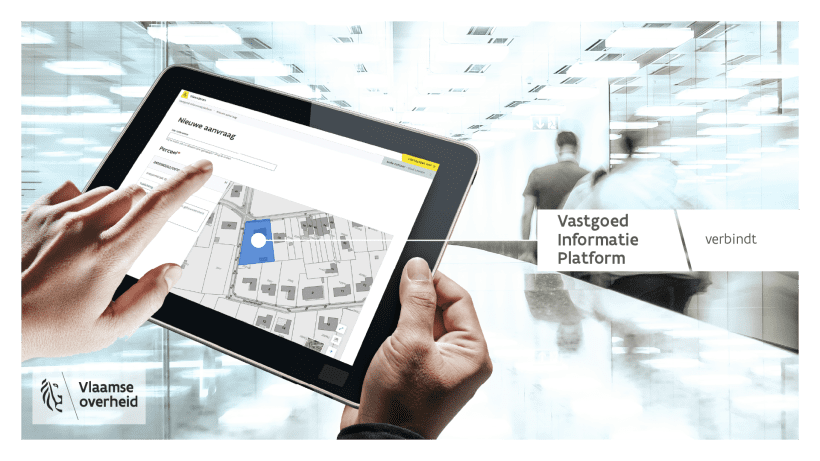Flemish Data Utility Company Projects
We are currently working on the following projects.

My Professional Data
An employee shares a lot of data with various parties in the course of his or her career. This may be personal data (such as place of residence, family status, degrees and/or recognition), but also professional data (such as pay slips and vacation certificates).
Vacation certificates, for example, are in turn shared with a new employer to calculate the number of days off work, and pay slips are needed to apply for a loan from the bank or a bonus from the government.
Citizens will be able to control what happens to their data
With My Professional Data, we want to unburden citizens in sharing that data, without losing control of it. In the current processes, the citizen is the conduit for all this data, but too often this still has to be done manually. The citizen himself has to search for the necessary documents, digitize them and then deliver them. On the side of (potential) employers or other parties who have to work with the data, there are then also several manual steps.
With concepts such as Solid, we can ensure that this process, at the request of the citizen, can be automated. In turn, recipients of that data can also organize their processes more efficiently and securely.
We are working on two specific cases
Real Estate Information Platform (Vastgoedinformatieplatform)

Collecting information for the sale of real estate is a process that today is administratively fragmented and time-consuming. Town planning information, environmental information, information about easements, etc. now often have to be manually looked up at the various administrations. The Real Estate Information Platform (Vastgoedinformatieplatform or VIP) changes this.
The VIP will be a digital platform where applicants for real estate information can request the necessary data and documents within the framework of a sale or long-term lease in one simple way. The platform collects all data from available, connected sources, such as central registers and municipalities.
The Flemish Data Utility Company is taking on the development and operation of the Real Estate Information Platform, in which all authentic information flows around real estate are offered digitally tailored to the real estate-related sales process via a data platform. This will not only speed up the turnaround time for the purchase or sale of a property but will also make the entire process more transparent, qualitative and simple.
The VIP is an initiative of the municipalities, in cooperation with VVSG , the real estate sector and the Flemish Government. Digitaal Vlaanderen is responsible for the development of the platform and its operational management.
More information about the Real Estate Information Platform (dutch).(opent in nieuw venster)
Data Finder (Datavindplaats)

The Flemish Data Utility Company makes data more discoverable, so that it is used more.
By developing and launching a Data Finder in the spring of 2022, we are bringing the supply of public and private data together in one central location. Data Finder creates transparency, which is necessary to mobilize the knowledge, expertise and dynamism in society. This ensures democratic access to data, with minimal barriers for everyone.
Today, the Data Finder provides an overview of available databases and sources within the Flemish Government. This breaks down silos, reduces the risk of duplication, and creates opportunities for new insights based on data analysis and the combination of data.
These include open data and geographical data such as those that can be found today in the Flemish Open Data Portal. Moreover, for the first time, closed data and services and open APIs are now also included in the same Data Finder.
Meanwhile, the Data Finder team continues to work on improving the quality of the available datasets and the information about these data, but is also preparing the integration of data from private parties.
Flemish Smart Data Space (Vlaamse Smart Data Space)

The Flemish Smart Data Space ensures the sustainable publication and consultation of rapidly evolving data and their context information. As a decentralized solution, the Flemish Smart Data Space uses a shared ecosystem with clear rules of play and building blocks, allowing data to be smartly shared, published and reused by both public and private players.
Learn more about the Flemish Smart Data Space (dutch).
Generic Public Domain Information Platform (Generiek Informatieplatform Openbaar Domein or GIPOD)
GIPOD makes all data on intakes and scheduled mobility impacts on the public domain publicly available for reuse. Just think of road works, a running race or a moving elevator commissioned by a private citizen.
GIPOD is the authentic resource that helps ensure that nuisances are minimized, by planning the construction of utilities together, for example. Not only are these synergies cost-effective, but it is also a whole lot more pleasant when a footpath only has to be opened once instead of three times in quick succession.
GIPOD also makes all this information available to third parties as data. For example, Waze, but also De Lijn or the emergency services use it to determine road routes.
In 2021, GIPOD was completely renewed, including these changes:
- Commissioning of a standard dataset to make it easier to share data.
- Better estimation of mobility disruption with a focus on soft mobility.
- Digitalization of permit processes.
- Automatic conflict detection at intakes.
These innovations are currently being rolled out, but the GIPOD team is already thinking further into the future, for example, more automation and implementing user input.
Cable and pipeline information portal (Kabel- en Leidinginformatieportaal or KLIP).
More than 600,000 km of cables and pipes lie underground in Flanders. It is therefore not surprising that the risk of damage to underground cables and pipes during earthworks is high. To avoid this, the KLIP was created. Anyone who now wants to carry out groundwork must first submit an application to KLIP.
Through standardization and an agreed data model, all information from the cable and pipeline operators involved is contained in one integrated plan that can also be downloaded and consulted via an app.
KLIP sits at the intersection in data sharing between government and private. Many of the member organizations (plan applicants and pipeline operators) are private companies. In addition, KLIP is completely self-supporting financially: its operation is paid for by revenue from plan applications.
